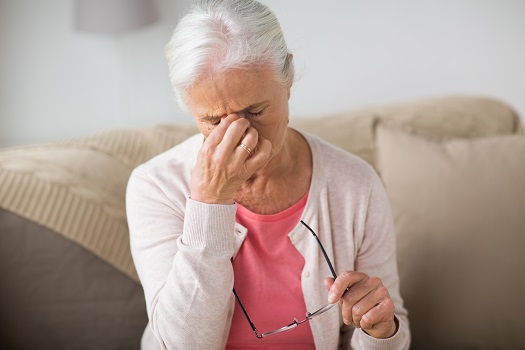A stroke can occur whenever blood flow to the brain is blocked, so strokes are common in seniors who have blood clots or broken blood vessels in the brain. When this happens, portions of the brain begin to die off due to a lack of oxygen. The outcome for a stroke can vary depending on which part of the brain is damaged during the stroke.
Right Side of the Cerebrum
In addition to controlling motor functions along the left side of the body, the right side of the cerebrum also manages creative functions such as spatial awareness, music awareness, and imagination. After a stroke in this area, seniors may have weakness all along the left side of the body and lose the ability to see or hear along the left side. They may also have difficulty with memory, depth perception, and directions. The ability to do things such as recognize body parts, locate objects, understand maps, and judge distances may be impaired.
Stroke survivors who recover at home often need help with the everyday tasks of life. Many seniors prefer aging in place over moving to an assisted living facility. If your senior loved one needs assistance to remain safe and comfortable while living at home, reach out to Home Care Assistance, a leading Anchorage senior care agency. Our dedicated in-home caregivers can assist with meal prep, bathing and grooming, exercise, medication reminders, and many other important tasks.
Left Side of the Cerebrum
The left side of the cerebrum manages functions for the right side of the body, and it’s also responsible for processing numbers, language, logic, and reasoning. After a stroke, a senior may not be able to read and write easily. He or she may lose the ability to talk or understand language, and doing math may be difficult. A stroke in the left part of the cerebrum can also lead to difficulty controlling and judging sensations along the right side of the body.
The Cerebellum
The cerebellum is the part of the brain situated underneath the cerebrum and toward the back of the head. This important part of the brain is in charge of managing sensory information sent to and from the spinal cord. People who have strokes in this area may find it difficult to walk because of coordination and balance issues. They may not be able to move certain parts of the body, and they may also have poor fine motor skills. Difficulties with managing sensory input can also result in nausea, dizziness, and headaches.
The effects of a stroke in the cerebellum can make it difficult for seniors to live at home safely without a caregiver close by at all times. Certain age-related conditions can make it more challenging for seniors to age in place safely and comfortably, but Anchorage live-in care experts are available around the clock to help seniors manage their health. Whether your loved one is living with dementia or is recovering from a stroke, you can trust the professional live-in caregivers from Home Care Assistance to enhance his or her quality of life.
The Brainstem
This area at the base of the brain is very important because it controls key functions such as breathing, heartbeat, eating, and blood pressure. Due to the brainstem’s importance, a stroke in this area is potentially life-threatening. Seniors who don’t die may end up in a coma, and they may not be able to breathe or regulate their hearts on their own. Those who have lighter strokes tend to have difficulty with swallowing, moving, breathing normally, controlling their body temperature, and maintaining a normal heart rate.
A senior stroke survivor often needs very specialized care from someone with experience in providing support during stroke recovery. Caring for a senior loved one can be challenging for families who don’t have expertise or professional training in home care, but this challenge doesn’t have to be faced alone. Family caregivers can turn to Anchorage Home Care Assistance for the help they need. We provide high-quality live-in and respite care as well as comprehensive Alzheimer’s, dementia, stroke, and Parkinson’s care. Reach out to us at Home Care Assistance if you need compassionate, professional care for your loved one. Call one of our dedicated Care Managers today at (907) 770-0907 to learn about the high quality of our in-home care services.
